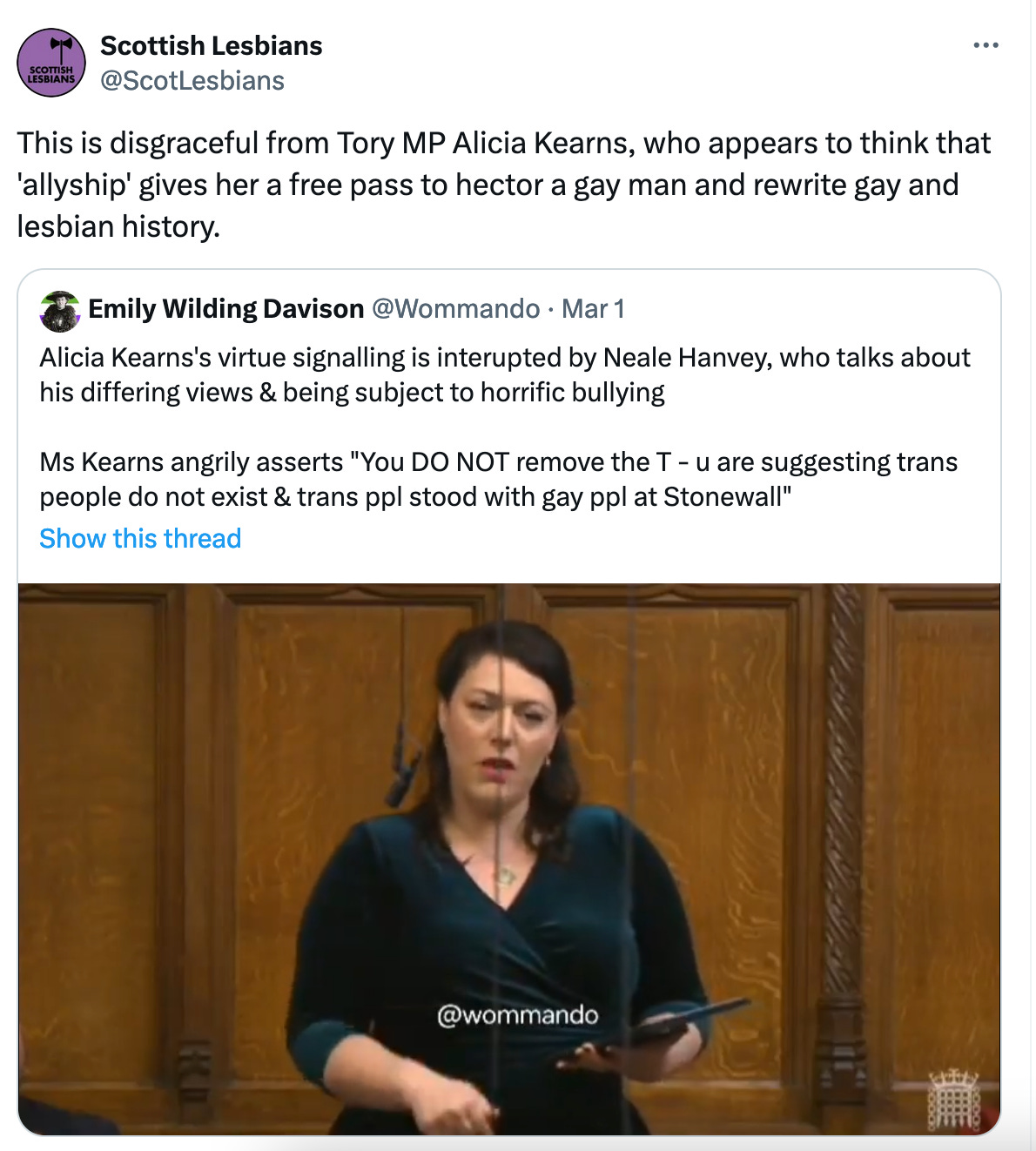Lesbian allies?
Yesterday’s events in Parliament, where an MP on one side of the House used her ‘allyship’ to berate a Member on the other side, got me thinking about allies. ‘Allyship matters’ said Alicia Kearns, while acknowledging that she was speaking as a straight woman. The MP she berated is gay and she was giving him a telling off for defining himself as LGB rather than LGBT. What, then, does allyship mean? What’s the point of it? Who is it for?
Well, not Neale Hanvey, clearly, who was told in no uncertain terms that he’s the wrong kind of gay.
Allyship is seen as an unequivocally good thing, something all right-thinking people should aim to be. Straight people are encouraged to be allies. There are guides to doing it properly. Stonewall promotes allyship- they run an ‘LGBTQ+ Allies Programme’ to help employers ‘transform workplaces for the better’. In 2022, Manchester Pride produced a seven point guide for allies attending Pride. Politicians of all stripes are falling over themselves to claim allyship. Allies are everywhere.
LGB people needed support from sympathetic friends to get rid of Section 28, gain the protection of the Equality Act, and achieve marriage equality. Scottish Lesbians recently had brilliant support from feminist friends who organised a protest at Glasgow Women’s Library against their showcasing of a lesbophobic zine.
Why, then, does the whole ‘ally’ thing worry me?
I think it comes down to two, intertwined, things. The word ‘ally’ itself, and the actions of people who claim to be allies.
‘Ally’ implies a very formal, possibly military, relationship. Allies are in a transactional relationship, teaming up over a single issue, generally where there is mutual benefit or a common goal. ‘Ally’ isn’t synonymous with ‘friend’, and it doesn’t imply respect, or liking, or indeed altruism. It suggests there’s something in it for the person claiming allyship. Of course, for employers, there is- a strong show of allyship means lots of lovely equality points from Stonewall.
‘Ally’ also implies that there is a weakness about being LGB, that we need stronger people to defend us and prop us up in some way. It’s infantilising. It takes our voice away. Some straight people claiming allyship feel empowered and entitled to speak for us and over us, rather as Alicia Kearns MP did in Parliament. It has been a very useful tool to misogynists and bullies, who claim it as their justification for aggressive language and thought policing of anyone perceived to be on the ‘wrong’ side. Abusers can now identify as supporters.
Alicia was also, of course, only being an ally to one part of the rainbow alphabet. She wasn’t concerned with supporting gay people, only trans. The use of ‘LGBTQ+ ally’ reinforces the forced teaming that sees homosexuals and bisexuals- people with a minority sexual orientation- shackled to people claiming a minority ‘gender identity’. This is not uncommon. People claiming allyship often mean that they support trans people. They either fail to understand, or don’t care, that there is a fundamental conflict between the rights of LGB people to be same-sex attracted and the rights of trans people to identify as they choose.
Because Stonewall have promoted it as an unequivocally good thing, and because no-one wants to be seen as a bigot, allyship has been a very useful tool in forcing acceptance of gender ideology. It’s been embedded so successfully in British institutions that allyship can now be used as a wedge to introduce more and more extreme ideas- support puberty blockers or you’re not a good ally. Support breast binders for pubescent girls. Support surrogacy. Support fetishes. I wonder how many allies realise exactly what they’re supporting when they put their pronouns in their emails.
Allyship is also very performative. You can wear a badge, show your pronouns, berate bigots and wrong-thinkers, and induce grovelling apologies from celebrities. Our recent First Minister could hardly talk about trans people without a box of tissues at hand. There are depressingly many high profile lesbians who are prepared to vocally express their allyship with trans identifying men, but who strangely don’t seem to have got round to finding them suitable as life partners- although, of course, they’re more than happy for the rest of us to learn to appreciate the shenis.
I’m sure there are lots of people out there who are claiming allyship with the best of intentions. They genuinely want to help people who have historically had a very hard time. Imagine a world in which this translated to behaviour like listening to the experiences and the knowledge of people in minority groups, rather than talking over them. All too often, ‘ally’ (as trained by Stonewall) reminds us of other words starting with ‘a’. Such as ‘arrogance’ and ‘asshattery’.



